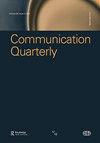Relational turbulence processes among avoidant and anxious spouses
IF 1
Q2 COMMUNICATION
引用次数: 0
Abstract
ABSTRACT Relational turbulence theory (RTT) articulates processes that explain why spouses evaluate their marriages as chaotic. Specifically, RTT predicts that relational uncertainty biases cognitive appraisals about the marriage and that partner interference with daily routines heightens negative emotions toward the spouse, both of which, culminate in relational turbulence. Our study confirmed these theoretical processes in marriage. However, by integrating attachment theory predictions into RTT to further inform these processes, we demonstrated that RTT’s mechanisms were not the same for all spouses as they were dependent upon individuals’ attachment dimensions. Results of a latent profile analysis with distal outcomes indicated that RTT’s relationship parameters differed among spouses’ attachment styles, and results of conditional process models revealed that spouses who were higher in both attachment avoidance and anxiety experienced the most relational turbulence through theorized processes. Because RTT’s relationship parameters and processes differed by spouses’ attachment, our results speak to the importance of considering the moderation of RTT’s mechanistic pathways with particular emphasis on partners who vary in relationship security and interpersonal vulnerabilities回避型和焦虑型配偶之间的关系动荡过程
关系动荡理论(RTT)阐述了解释配偶为什么认为他们的婚姻是混乱的过程。具体而言,RTT预测,关系的不确定性会使对婚姻的认知评估产生偏差,伴侣对日常生活的干扰会加剧对配偶的负面情绪,这两者都会导致关系动荡。我们的研究证实了婚姻中的这些理论过程。然而,通过将依恋理论预测纳入RTT以进一步告知这些过程,我们证明RTT的机制并非对所有配偶都相同,因为它们取决于个人的依恋维度。对远端结果的潜在剖面分析结果表明,RTT的关系参数在配偶的依恋风格之间存在差异,条件过程模型的结果表明,在依恋回避和焦虑方面都较高的配偶通过理论化过程经历了最多的关系动荡。由于RTT的关系参数和过程因配偶的依恋而不同,我们的研究结果表明了考虑RTT机制途径的适度性的重要性,特别强调关系安全性和人际脆弱性不同的伴侣
本文章由计算机程序翻译,如有差异,请以英文原文为准。
求助全文
约1分钟内获得全文
求助全文

 求助内容:
求助内容: 应助结果提醒方式:
应助结果提醒方式:


